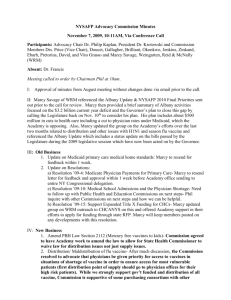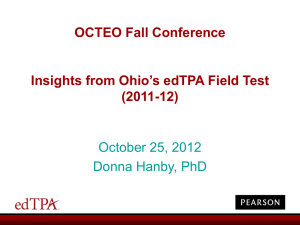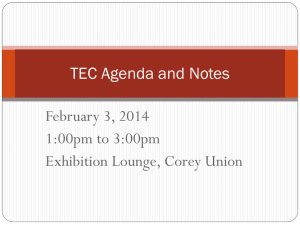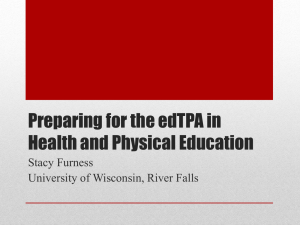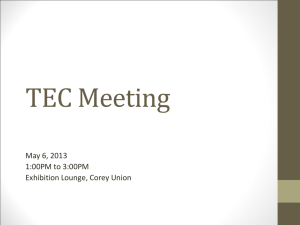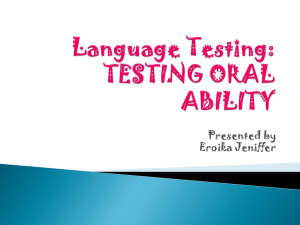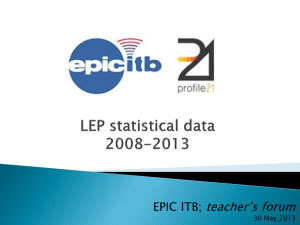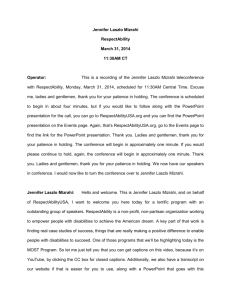on edTPA 7/12/13 3:07 PM
advertisement
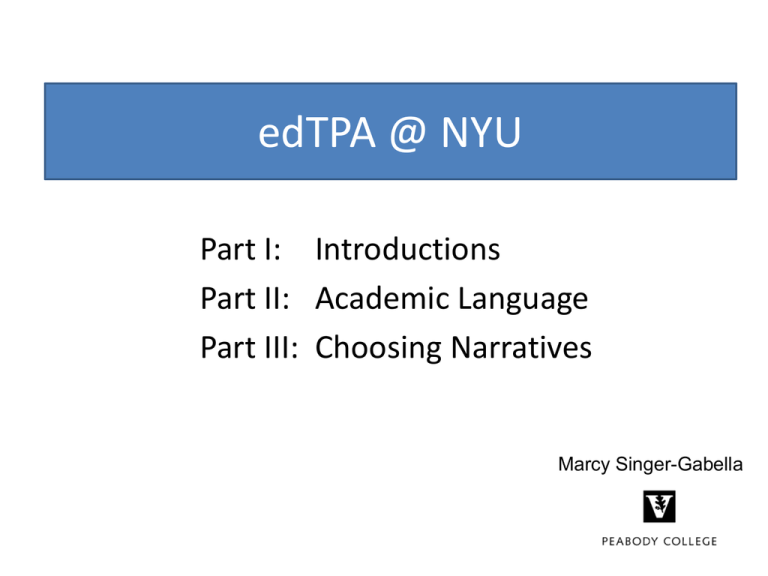
edTPA @ NYU Part I: Introductions Part II: Academic Language Part III: Choosing Narratives Marcy Singer-Gabella Part I: Introductions • What would make this session worthwhile for you? – What specifically would you think about? discuss? walk away with? Marcy Singer-Gabella Part II: Academic Language (honing in on language demands) • Strain Gauges • Formation of Carcinogens in the Preparation of Chicken • Pulsation Marcy Singer-Gabella STRAIN GAUGES • A strain gauge (also strain gage) is a device used to measure the strain of an object. • The most common type of strain gauge consists of an insulating flexible backing, which supports a metallic foil pattern. • The gauge is attached to the object by a suitable adhesive, such as cyanoacrylate. • As the object is deformed, the foil is deformed, causing its electrical resistance to change. Assignment: Please read the article and solve the problem. Task developed by Emily Pendergrass, Vanderbilt University edTPA re: Language Demands • • • • Language Functions Vocabulary Syntax Discourse See Academic Language Crib Sheet Marcy Singer-Gabella Formation of Carcinogens in the Preparation of Chicken Identify and analyze the language demands in this TEDx Talk. Consider: • Language functions • Vocabulary • Syntax • Discourse http://www.ted.com/talks/award_winning_teen_age_science_in_action.html Marcy Singer-Gabella Pulsation Read pilot submission for Task 1, focusing on prompts 1a-1c, 4a-4d, and lesson plans – What language demands does the candidate identify for the proposed learning segment? – What other language demands can you identify? – How / to what extent does the candidate plan to support students’ in meeting these demands? Marcy Singer-Gabella Discussion Where in your program would candidates learn to identify language demands and develop supports for their students? Marcy Singer-Gabella Part III: Choosing Narratives Defining the Role of edTPA at NYU Overview • Two Implementation Narratives • Choosing Narrative 1 – as a philosophical commitment – as a matter of practice Marcy Singer-Gabella Implementation Narrative 1: “We own this.” The Plot: 1. OMG – “this” (what the edTPA examines) is what we try to prepare students to do; this assessment can serve us well. 2. UH OH – they’re not quite doing “this” (with an interlude of denial) 3. AHHH – now they’re doing “this”… and the work is worth it Marcy Singer-Gabella Implementation Narrative 2: “They did it to us.” (#$^%...) The Plot: 1. The legislature/ The state bureaucrats/ My dean… decided we have to do this. 2. They can make us do it, but they can’t make us like it. 3. So much work… and for what? Marcy Singer-Gabella Choosing Narrative 1 philosophical commitment stance on teaching “OURS” matter of practice shared learning planning & support A Stance on Teaching • Actively engage students in intellectually ambitious tasks • Use a variety of teaching strategies • Assess student learning continuously • Adapt teaching to student needs • Create effective scaffolds and supports • Provide clear standards, constant feedback, and opportunities for revising work • Develop and effectively manage a collaborative classroom in which all students have membership. Marcy Singer-Gabella Teaching as Leveraging Student Thinking and Experience Rubric 6: Candidate provides a challenging learning environment that provides opportunities to express varied perspectives and promotes mutual respect among students. Rubric 7: Candidate prompts students to link prior academic learning and personal, cultural, or community assets to new learning. Rubric 8: Candidate elicits and builds on student responses to develop analyses or interpretations of history/social studies sources and accounts or support arguments. Candidate facilitates interactions among students to develop their abilities to evaluate their own interpretations, analyses, Marcy Singer-Gabella leveraging what faculty & supervisors bring “OURS” Marcy Singer-Gabella “OURS” matters of practice (eliciting, attending, interpreting, building) • Alignment exercises (vision, standards, assessments) Examination of candidates’ work • Course analysis (where do candidates learn…) Examination of candidates’ work • (Deliberate) incidental conversation… Examination of candidates’ work • Scorer training and scoring Examination of candidates’ work Marcy Singer-Gabella From OMG/Uh-Oh to Ahhh at Vanderbilt Clarifying the stance, sharpening focus: planning & instruction that link all learners to subject matter systematic assessment and response to learners’ developing understanding attention to content specific language demands Realigning and revising courses communicating clear performance criteria working performance data Collaborating across institutions & with state & district partners “OURS” weaving edTPA into the institutional fabric an occasion for program inquiry & renewal (again, confronting performance) a context for critical research an opportunity for extended engagement with partners in the field (assessing teaching, CCSS, etc.) Marcy Singer-Gabella Working the ideas in practice • What does edTPA offer you? • What commitments and assets do you and your colleagues bring to the table? • How might you leverage these commitments and assets to implement edTPA in ways that make your program and your graduates better? • What are your first three steps? Marcy Singer-Gabella What will it be? Ahhh or (#$^%...)? Marcy Singer-Gabella Questions? Please ask! m.singer-gabella@vanderbilt.edu Marcy Singer-Gabella
